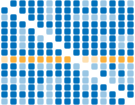Il passero solitario (Italian)
D’in su la vetta della torre antica,
Passero solitario, alla campagna
Cantando vai finchè non more il giorno;
Ed erra l’armonia per questa valle.
Primavera dintorno
Brilla nell’aria, e per li campi esulta,
Sì ch’a mirarla intenerisce il core.
Odi greggi belar, muggire armenti;
Gli altri augelli contenti, a gara insieme
Per lo libero ciel fan mille giri,
Pur festeggiando il lor tempo migliore;
Tu pensoso in disparte il tutto miri;
Non compagni, non voli,
Non ti cal d’allegria, schivi gli spassi;
Canti, e così trapassi
Dell’anno e di tua vita il più bel fiore.
Oimè, quanto somiglia
Al tuo costume il mio! Sollazzo e riso,
Della novella età dolce famiglia,
E te german di giovinezza, amore,
Sospiro acerbo de’ provetti giorni,
Non curo, io non so come; anzi da loro
Quasi fuggo lontano;
Quasi romito, e strano
Al mio loco natio,
Passo del viver mio la primavera.
Questo giorno ch’omai cede alla sera,
Festeggiar si costuma al nostro borgo.
Odi per lo sereno un suon di squilla,
Odi spesso un tonar di ferree canne,
Che rimbomba lontan di villa in villa.
Tutta vestita a festa
La gioventù del loco
Lascia le case, e per le vie si spande;
E mira ed è mirata, e in cor s’allegra.
Io solitario in questa
Rimota parte alla campagna uscendo,
Ogni diletto e gioco
Indugio in altro tempo: e intanto il guardo
Steso nell’aria aprica
Mi fere il Sol che tra lontani monti,
Dopo il giorno sereno,
Cadendo si dilegua, e par che dica
Che la beata gioventù vien meno.
Tu, solingo augellin, venuto a sera
Del viver che daranno a te le stelle,
Certo del tuo costume
Non ti dorrai; che di natura è frutto
Ogni vostra vaghezza.
A me, se di vecchiezza
La detestata soglia
Evitar non impetro,
Quando muti questi occhi all’altrui core,
E lor fia voto il mondo, ed il dì futuro
Del dì presente più noioso e tetro,
Che parrà di tal voglia?
Che di quest’anni miei? che di me stesso?
Ahi pentirommi, e spesso,
Ma sconsolato, volgerommi indietro. | Publisher | Budapest, Magvető Kiadó. |
| Source of the quotation | Szerb Antal: Száz vers. Negyedik kiadás. 16, 18. p. |
|
The lonely sparrow (English)
Thou from the top of yonder antique tower,
O lonely sparrow, wandering, hast gone,
Thy song repeating till the day is done,
And through this valley strays the harmony.
How Spring rejoices in the fields around,
And fills the air with light,
So that the heart is melted at the sight!
Hark to the bleating flocks, the lowing herds!
In sweet content, the other birds
Through the free sky in emulous circles wheel,
In pure enjoyment of their happy time:
Thou, pensive, gazest on the scene apart,
Nor wilt thou join them in the merry round;
Shy playmate, thou for mirth hast little heart;
And with thy plaintive music, dost consume
Both of the year, and of thy life, the bloom.
Alas, how much my ways
Resemble thine! The laughter and the sport,
That fill with glee our youthful days,
And thee, O love, who art youth's brother still,
Too oft the bitter sigh of later years,
I care not for; I know not why,
But from them ever distant fly:
Here in my native place,
As if of alien race,
My spring of life I like a hermit pass.
This day, that to the evening now gives way,
Is in our town an ancient holiday.
Hark, through the air, that voice of festal bell,
While rustic guns in frequent thunders sound,
Reverberated from the hills around.
In festal robes arrayed,
The neighboring youth,
Their houses leaving, o'er the roads are spread;
They pleasant looks exchange, and in their hearts
Rejoice. I, lonely, in this distant spot,
Along the country wandering,
Postpone all pleasure and delight
To some more genial time: meanwhile,
As through the sunny air around I gaze,
My brow is smitten by his rays,
As after such a day serene,
Dropping behind yon distant hills,
He vanishes, and seems to say,
That thus all happy youth must pass away.
Thou, lonely little bird, when thou
Hast reached the evening of the days
Thy stars assign to thee,
Wilt surely not regret thy ways;
For all thy wishes are
Obedient to Nature's law. But ah!
If I, in spite of all my prayers,
Am doomed the hateful threshold of old age
To cross, when these dull eyes will give
No response to another's heart,
The world to them a void will be,
Each day become more full of misery,
How then, will this, my wish appear
In those dark hours, that dungeon drear?
My blighted youth, my sore distress,
Alas, will then seem happiness! | Source of the quotation | http://colecizj.easyvserver.com |
|
